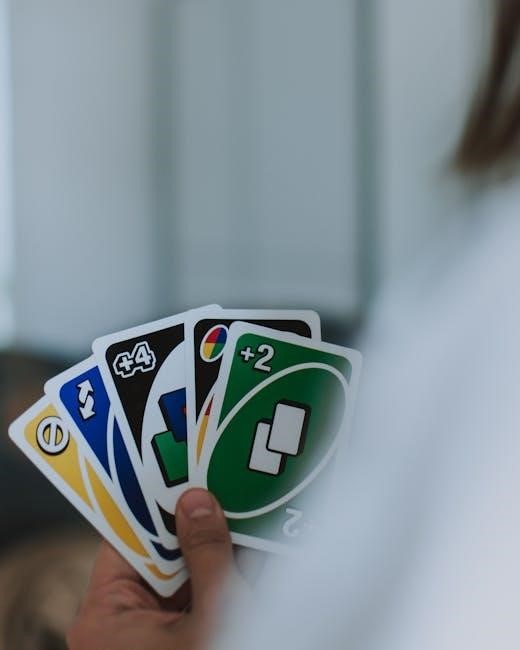The crossword clue “One Who Instructs” is a common yet intriguing puzzle that tests vocabulary and pattern recognition․ It often leads to answers like “teacher” or “tutor‚” challenging solvers to think creatively while remaining straightforward․ This clue is popular in crosswords for its versatility and ability to fit various grid sizes‚ making it a staple in both casual and competitive puzzles․ Understanding its nuances can enhance your solving skills and expand your crossword strategy․
1․1 Understanding the Clue
The clue “One Who Instructs” refers to an individual who provides guidance or education․ Common solutions include “teacher‚” “tutor‚” or “coach‚” depending on context․ Recognizing synonyms and word lengths helps in solving it effectively․
1․2 Importance of the Clue in Crossword Puzzles
The clue “One Who Instructs” holds significant value in crossword puzzles due to its versatility and common usage․ It often appears in various grid sizes and difficulty levels‚ making it a frequent challenge for solvers․ This clue requires a blend of vocabulary knowledge and critical thinking‚ which enhances problem-solving skills․ Additionally‚ it serves as a foundational clue for beginners‚ helping them build confidence in tackling more complex puzzles․ Its prevalence ensures that mastering this clue can significantly improve overall crossword-solving efficiency and enjoyment‚ making it a key element in both casual and competitive puzzle experiences․

Definition and Synonyms
“One Who Instructs” refers to someone who teaches or guides others‚ such as a teacher‚ tutor‚ mentor‚ coach‚ or professor․ These roles involve educating and directing individuals to achieve understanding or skill in a particular area․ Synonyms include educator‚ instructor‚ and trainer‚ all of which encapsulate the essence of imparting knowledge and expertise․ The term is versatile and can apply to various settings‚ from academic environments to professional development․ Understanding these synonyms is crucial for effectively solving crossword clues related to this topic․
2․1 Direct Meaning of “One Who Instructs”
The direct meaning of “One Who Instructs” refers to an individual who imparts knowledge‚ skills‚ or wisdom to others․ This person could be a teacher‚ tutor‚ mentor‚ coach‚ or professor․ Their primary role is to educate‚ guide‚ and help others understand or master a subject‚ concept‚ or activity․ In crossword puzzles‚ this clue often seeks a noun that encapsulates the essence of teaching or guiding‚ making it a straightforward yet meaningful entry․ The term is versatile and can apply to various contexts‚ from academic settings to professional training environments․
2․2 Common Synonyms
Common synonyms for “One Who Instructs” include educator‚ mentor‚ coach‚ lecturer‚ and trainer․ These terms all describe individuals who guide others in learning or skill development․ An educator often refers to a teacher or academic professional‚ while a mentor provides personalized guidance․ A coach may focus on sports or performance improvement‚ and a lecturer delivers instruction in a classroom or presentation setting․ A trainer typically specializes in teaching practical skills or procedures․ These synonyms vary slightly in context but all share the core concept of imparting knowledge or expertise․ Recognizing these variations is key to solving crossword clues effectively․
2․3 Contextual Variations
The crossword clue “One Who Instructs” can vary in meaning depending on the context․ For example‚ in an academic setting‚ the answer might be “professor” or “lecturer‚” while in a spiritual context‚ it could be “guru” or “mentor․” In sports‚ “coach” is a common solution․ The clue’s versatility allows it to fit various themes‚ from education to personal development․ Some crosswords might also use less common terms like “instructor” or “educator” to add complexity․ Understanding these contextual variations is essential for accurately solving the clue‚ as the answer often depends on the puzzle’s specific category or subject area․ This adaptability makes the clue both challenging and engaging for solvers․

How to Solve the Clue
To solve the “One Who Instructs” crossword clue‚ examine the clue carefully‚ consider possible synonyms like “teacher” or “tutor‚” and use online crossword solvers for quick answers․ Always check word length and letter patterns to narrow down possibilities effectively․ This systematic approach ensures accuracy and efficiency in finding the correct solution․
3․1 Analyzing the Clue
Analyzing the crossword clue “One Who Instructs” begins with identifying keywords that hint at the answer․ Look for terms like “teacher‚” “tutor‚” or “educator‚” which are common solutions․ Consider the clue’s phrasing: “One Who Instructs” suggests a person facilitating learning․ Think about synonyms and related concepts‚ like “mentor” or “professor‚” to broaden possibilities․ Check the word length and letter patterns in the crossword grid to narrow down options․ Additionally‚ examine the clue’s context within the puzzle‚ as nearby answers may provide hints․ Online crossword solvers can also help verify potential solutions quickly․ Effective analysis combines linguistic knowledge with strategic thinking to pinpoint the correct answer efficiently․
3․2 Using Crossword Solver Tools
Crossword solver tools are invaluable for quickly finding answers to clues like “One Who Instructs․” Websites such as Crossword Solver by WordFind․org or TheCrosswordSolver․com allow users to input the clue and any known letters․ These tools search extensive databases to provide likely solutions‚ such as “teacher” or “professor․” They often list multiple possibilities‚ ranked by relevance‚ saving time and effort․ Advanced features may include filtering by word length or letter pattern‚ making it easier to match the crossword grid․ For tricky clues‚ these tools are a reliable resource to uncover answers efficiently and accurately‚ ensuring progress in solving the puzzle․
3․3 Considering Word Length and Letters
When solving the clue “One Who Instructs‚” it’s essential to consider the word length and letters․ Crossword clues often specify the number of letters‚ helping narrow down possibilities․ For example‚ if the answer is seven letters‚ “teacher” fits perfectly․ Start by counting the spaces in the crossword grid to determine the word length․ Next‚ look for common letter patterns or prefixes/suffixes associated with instruction‚ such as “teach” or “train․” Cross-referencing letters from intersecting clues can also provide hints․ By focusing on letter count and patterns‚ solvers can efficiently identify the correct answer‚ such as “teacher” or “trainer‚” and fill in the grid accurately․
3․4 Checking for Common Crossword Answers
When solving “One Who Instructs‚” checking common crossword answers can save time․ Frequently‚ the answer is “teacher” or “trainer‚” which are popular in puzzles due to their relevance and letter length․ Crossword solvers often rely on these go-to words‚ as they fit various grid sizes․ Using online tools or crossword dictionaries can help verify these answers quickly․ Additionally‚ considering common synonyms like “educator” or “mentor” can broaden your options․ By focusing on frequently used answers‚ you can efficiently fill in the grid and move forward with the puzzle․ This strategy is especially helpful for beginners or those short on time․

Advanced Techniques for Solving
Advanced solvers use anagrams‚ wordplay‚ and pattern recognition to crack “One Who Instructs․” Employing crossword dictionaries and solver tools can reveal less common answers efficiently‚ enhancing your strategy․
4․1 Understanding Wordplay and Anagrams
Mastering wordplay and anagrams is crucial for solving complex crossword clues like “One Who Instructs․” Anagrams involve rearranging letters to form new words․ For example‚ “listen” can become “silent․” In crosswords‚ clues often hint at such transformations․ Wordplay may include puns‚ double meanings‚ or clever twists․ To tackle “One Who Instructs‚” look for synonyms like “teacher” or “mentor‚” but also consider anagrams or less obvious terms․ By recognizing these techniques‚ solvers can unlock tricky clues and enhance their puzzle-solving skills․ Practice and familiarity with wordplay will make you a more efficient and confident crossword enthusiast․
4․2 Identifying Themed Entries
Identifying themed entries is a valuable skill in crossword solving‚ particularly for clues like “One Who Instructs․” Themed entries often relate to a specific category or pattern within the puzzle․ For example‚ a clue might hint at a profession‚ such as “teacher” or “mentor‚” which fits the “One Who Instructs” theme․ Recognizing these themes can help narrow down possible answers․ Pay attention to surrounding clues and grid positions‚ as they often align with the theme․ Using crossword solver tools can also reveal patterns and connections․ By mastering themed entries‚ solvers can enhance their efficiency and enjoyment of crossword puzzles․
4․3 Utilizing Crossword Puzzle Dictionaries
Crossword puzzle dictionaries are indispensable tools for solving clues like “One Who Instructs․” These specialized dictionaries are designed to help solvers quickly find words that match specific patterns or meanings․ They often include lists of synonyms‚ anagrams‚ and less common words that frequently appear in crosswords․ By consulting a crossword dictionary‚ solvers can identify potential answers that fit the given clue and word length․ Additionally‚ these resources often highlight thematic entries and uncommon terms‚ making them particularly useful for challenging clues․ Regular use of crossword dictionaries can significantly improve both speed and accuracy‚ helping solvers tackle even the toughest puzzles with confidence․

The Role of Context in Crossword Puzzles
Context is crucial in crosswords‚ as it helps narrow down possible answers․ Clues often have multiple meanings‚ so understanding the surrounding words and theme can clarify the intended solution‚ making the puzzle more solvable and enjoyable․
5․1 Importance of Grid Position
The position of the clue in the grid significantly impacts its solvability․ Crosswords often place easier clues in the top-left corner and harder ones towards the bottom-right․ For “One Who Instructs‚” its placement can indicate whether the answer is a common word like “teacher” or a more obscure term․ Overlapping letters with other clues provide additional hints‚ helping solvers piece together the answer more efficiently․ Paying attention to where the clue appears can make the difference between solving it quickly or struggling for hours․
5․2 Interpreting Clues Within the Puzzle
Interpreting clues within the puzzle requires a holistic approach‚ as crossword answers often depend on surrounding words and grid connections․ For “One Who Instructs‚” solvers must consider intersecting letters and how they might form common synonyms like “teacher” or “mentor․” Clues can sometimes have multiple interpretations‚ so understanding the puzzle’s theme or context is crucial․ Additionally‚ online crossword solvers can help verify partial answers‚ ensuring accuracy․ By carefully analyzing the interplay of clues and their positions‚ solvers can efficiently uncover the correct answer and progress smoothly through the puzzle․
5․3 Using Crosswords as a Learning Tool
Crossword puzzles are more than just entertainment; they serve as an excellent learning tool․ Solving clues like “One Who Instructs” can expand your vocabulary and improve cognitive skills․ By encountering new words and their meanings‚ you enhance your language proficiency․ Crosswords also foster critical thinking and patience‚ as they require methodical problem-solving; Additionally‚ they can teach you about various subjects‚ from history to science‚ through themed puzzles․ This engaging format makes learning enjoyable and effective‚ helping you retain information better․ Crosswords are a fun and challenging way to grow your knowledge and sharpen your mind while enjoying a rewarding hobby․

Benefits of Solving Crossword Puzzles
Solving crossword puzzles offers numerous benefits‚ including enhanced vocabulary‚ improved cognitive function‚ and stress relief․ They challenge the brain‚ boosting memory and concentration‚ while providing a sense of achievement․ Crosswords also foster relaxation and can be a fun‚ intellectually stimulating hobby for all ages‚ making them a great way to unwind and keep your mind sharp․
6․1 Cognitive Improvement
Solving crossword puzzles significantly enhances cognitive function by strengthening memory‚ concentration‚ and problem-solving skills․ Engaging in crosswords regularly can improve neural connectivity‚ boosting brain health․ The process of recalling words and patterns stimulates the hippocampus‚ the brain’s memory center‚ while also enhancing executive functions like planning and decision-making․ Over time‚ this mental exercise can slow cognitive decline and reduce the risk of age-related memory issues․ Additionally‚ the challenge of deciphering clues promotes critical thinking and creativity‚ making crosswords a valuable tool for maintaining sharp mental acuity at any age․
6․2 Enhanced Vocabulary
Solving crossword puzzles‚ particularly clues like “One Who Instructs‚” is an excellent way to expand and refine your vocabulary․ Crosswords introduce solvers to new words‚ their meanings‚ and their usage in different contexts․ Regularly engaging with crosswords helps learners retain unfamiliar words and understand their nuances․ For instance‚ clues like “One Who Instructs” might lead to answers like “teacher” or “tutor‚” which are common synonyms․ This exposure fosters a deeper understanding of synonyms‚ antonyms‚ and wordplay‚ making it easier to recognize patterns and connections in future puzzles․ Over time‚ this practice enhances communication skills and sharpens linguistic precision․
6․3 Stress Relief and Leisure
Solving crossword puzzles‚ including clues like “One Who Instructs‚” offers a calming and enjoyable escape from daily stress․ Engaging in crosswords allows solvers to focus their minds on a relaxing activity‚ providing mental relaxation and a sense of accomplishment․ The process of solving clues can be meditative‚ helping to distract from worries and reduce tension․ Additionally‚ crossword puzzles are a popular leisure activity‚ offering a fun challenge that stimulates the brain while providing entertainment․ Many find joy in the satisfying moment of filling in the correct answer‚ making it a rewarding hobby for unwinding and enjoying free time․

Common Mistakes to Avoid
Common mistakes include ignoring keywords‚ overcomplicating clues‚ and not using resources․ Stay focused‚ use tools‚ and avoid these pitfalls for better solving success․
7․1 Ignoring Clue Keywords
One of the most common mistakes is ignoring keywords in crossword clues․ Keywords like “instructs” or “teacher” are critical for identifying the answer․ Overlooking these can lead to confusion and incorrect guesses․ For example‚ in the clue “One Who Instructs‚” the word “instructs” directly points to synonyms like “teacher” or “educator․” Failing to focus on such terms can result in wasted time and frustration․ To avoid this‚ always highlight or underline key words and phrases in the clue․ This practice helps narrow down possibilities and ensures you stay on the right track․ It’s a simple yet effective strategy for better solving outcomes․
7․2 Overcomplicating Simple Clues
Overcomplicating simple crossword clues is a common pitfall‚ especially with straightforward clues like “One Who Instructs․” Many solvers assume there’s a hidden trick or wordplay‚ leading them to overthink and second-guess obvious answers․ For instance‚ they might analyze the clue for anagrams or less common synonyms instead of recognizing that “teacher” or “instructor” fits perfectly․ This unnecessary complexity can delay solving and reduce enjoyment․ Staying grounded and trusting the clue’s simplicity often leads to quicker‚ more accurate solutions․ Remember‚ not every clue requires intricate decoding; sometimes‚ the answer is right in front of you․ Keep it simple and save time․
7․3 Not Using Available Resources
One of the most significant mistakes crossword solvers make is not utilizing available resources․ With clues like “One Who Instructs‚” online crossword solvers‚ dictionaries‚ and forums can provide instant answers or hints․ Many solvers hesitate to use these tools‚ fearing it might undermine their problem-solving skills․ However‚ these resources are designed to aid‚ not replace‚ the solving process․ They can help verify answers‚ reduce guessing‚ and save time․ Ignoring them often leads to frustration or incorrect answers․ Embracing these tools can enhance your efficiency and enjoyment of crosswords‚ making you a more confident and skilled solver over time․

Step-by-Step Guide to Solving
Start by analyzing the clue‚ then use crossword solvers or dictionaries to find matches․ Consider word length and letters‚ check common answers‚ and stay persistent for success․
8․1 Identifying the Clue Type
Identifying the clue type is crucial for effective solving․ The clue “One Who Instructs” is a definition-based clue‚ requiring solvers to think of synonyms or related terms; It often falls under general knowledge or vocabulary categories․ Recognizing this clue type helps narrow down possible answers‚ such as “teacher” or “mentor․” By understanding the clue’s nature‚ solvers can efficiently use tools like crossword solvers or dictionaries to find the best fit․ Accurate identification of clue types enhances problem-solving efficiency and overall crossword performance․
8․2 Using Online Crossword Solvers
Online crossword solvers are invaluable tools for quickly resolving clues like “One Who Instructs․” These platforms allow users to input the clue and specify word length‚ providing instant answers․ For example‚ entering “One Who Instructs” with a 7-letter constraint might yield “teacher” or “mentor․” Many solvers also support partial answers‚ helping fill in missing letters․ Advanced features like AI-driven suggestions enhance accuracy‚ ensuring the right fit for the puzzle․ By leveraging online solvers‚ crossword enthusiasts can save time and reduce frustration‚ while also discovering new words and meanings to expand their vocabulary for future challenges․
8․3 Persistence in Problem-Solving
Persistence is a key trait for mastering crossword puzzles‚ especially when tackling clues like “One Who Instructs․” Staying committed to solving a clue‚ even when it seems challenging‚ enhances problem-solving skills and boosts confidence․ Take breaks if needed‚ but return to the puzzle with a fresh perspective․ Persistence helps in exploring different angles and strategies‚ such as trying anagrams or considering less obvious meanings․ Over time‚ consistent effort leads to improved pattern recognition and a broader vocabulary‚ making future puzzles more enjoyable and manageable․ Embrace the journey‚ and let persistence guide you to crossword success․

Frequently Asked Questions
Q: What is the most common answer to “One Who Instructs”?
A: The answer is typically “teacher․”
Q: Are there other possible answers?
A: Yes‚ “instructor‚” “educator‚” or “tutor” can also fit․
Q: Why is “teacher” the most likely answer?
A: It is the most straightforward and commonly used term․
Q: Does the answer depend on the crossword’s context?
A: Sometimes‚ but generally‚ “teacher” is the standard solution․
9․1 What if I Can’t Find the Answer?
If you’re stuck on the clue “One Who Instructs‚” try using online crossword solvers or dictionaries for assistance․ Enter the clue and any known letters to narrow down possibilities․ Check the word length required by the grid and look for common crossword answers like “teacher” or “instructor․” If unsure‚ consult a thesaurus for synonyms or review similar puzzles for patterns․ Sometimes‚ taking a break and revisiting the clue with a fresh perspective can help․ Utilize resources like WordFind․org or crossword forums for additional support․ Persistent effort and the right tools can help you crack even the toughest clues․
9․2 How Do I Improve My Skills?
To improve your crossword-solving skills‚ start by regularly practicing with daily puzzles․ Use online tools like crossword puzzle dictionaries and solvers to find answers and learn new words․ Stay consistent and challenge yourself with more difficult puzzles over time․ Expand your vocabulary by reading books‚ articles‚ and learning synonyms․ Review clues and answers from past puzzles to identify patterns and common themes․ Analyze mistakes to understand where you went wrong and how to avoid them․ Additionally‚ engage with crossword communities or forums to share tips and strategies․ Over time‚ your problem-solving abilities and word knowledge will significantly improve․
9․3 Are There Tips for Beginners?

Beginners can start by solving easier crosswords to build confidence and familiarize themselves with common clue structures․ Start with short puzzles and gradually move to more complex ones․ Always read clues carefully and look for keywords that hint at the answer․ Use online crossword solvers to check answers and learn new words․ Keep a dictionary handy to verify definitions․ Pay attention to word lengths and letter patterns‚ as these can help narrow down possibilities․ Practice regularly and review mistakes to improve․ Engage with crossword communities for tips and encouragement․ Over time‚ these strategies will help you become a skilled solver․
Mastering the “one who instructs” clue requires a blend of vocabulary and strategic thinking․ With practice and the right resources‚ solvers can conquer even challenging puzzles․ Keep solving and enjoying the learning process!
10․1 Recap of Key Points
The crossword clue “one who instructs” typically refers to someone who teaches or guides‚ such as a teacher‚ tutor‚ or mentor․ Common answers include “tutor” or “teacher‚” with “tutor” being a frequent five-letter solution․ Solvers should consider word length‚ context‚ and potential wordplay․ Using online tools can help confirm the answer‚ especially when uncertain․ Understanding the clue’s meaning and leveraging resources are key to solving it effectively in various crossword puzzles․
10․2 Encouragement to Keep Solving
Embrace the challenge of crossword puzzles as a rewarding hobby that sharpens your mind and expands your vocabulary․ Each solved clue brings a sense of accomplishment and intellectual growth․ Stay persistent‚ as practice enhances your problem-solving skills and makes puzzles more enjoyable over time․ Leverage online tools and resources to aid your journey‚ and don’t hesitate to learn from mistakes․ The satisfaction of uncovering tricky answers‚ like “teacher” or “tutor” for “one who instructs‚” keeps the experience engaging․ Keep solving to enjoy the cognitive benefits and the sheer joy of mastering this timeless puzzle format․

No Responses